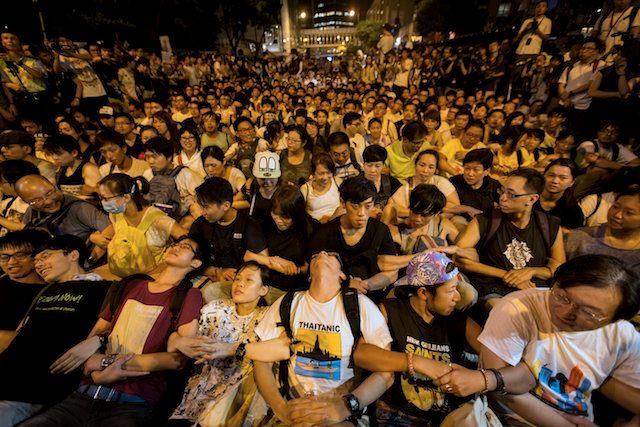SUMMARY
This is AI generated summarization, which may have errors. For context, always refer to the full article.

HONG KONG – A student leader vowed on Wednesday, October 1, to step up Hong Kong’s huge pro-democracy protests — including a possible occupation of government offices — unless the city’s leader steps down within a day, as support for the movement grew around the world.
The announcement came as tens of thousands of defiant demonstrators poured onto the streets on China’s National Day.
“If our Chief Executive and the central government (China) do not respect and listen to our people’s opinion, we will consider having different operating actions in future days, including occupying other places like important government offices,” said Agnes Chow of the Scholarism student movement.
Chow said the deadline for Chief Executive Leung Chun-ying was “today or tomorrow.” (READ: Anti-Occupy protesters in HK)
Chan Kin-man, co-founder of the pro-democracy Occupy Central movement which co-organized the demonstrations, said any escalation would be “an action initiative by the students” and called for it to be peaceful.
But he ruled out any dialogue with Leung.
“We can talk to anyone in the government except him… resign for the sake of Hong Kong.”
Leung has faced mounting calls to step down and has been criticized for failing to engage with protesters, after their “Umbrella Revolution” campaign for unfettered universal suffrage sparked the biggest civil unrest in the semi-autonomous Chinese city for decades.
Wednesday was a holiday marking the 65th anniversary of the founding of Communist China, and Thursday is also a holiday in Hong Kong.
As evening fell, thousands crammed into a one-kilometer stretch between the Central business district and Wanchai.
The Wall Street Journal reported that Leung’s administration is planning to sit out the protests — hoping they fizzle out rather than trying to clear them by force — on Beijing’s orders.
“Beijing has set a line to C.Y. (Leung). You cannot open fire,” the newspaper quoted a source familiar with the matter as saying. “You must halt it in a peaceful way.”
International support
International support for the protesters has been growing — a Facebook group calling itself “United for Democracy: Global Solidarity with Hong Kong” said it was planning events from Australia to the United States. (LIVE BLOG: #OccupyCentral HK)
More than 1,000 sympathizers gathered in the Taiwanese capital Wednesday night, while 80 attended a candlelight vigil in Singapore.
South African Nobel peace laureate Desmond Tutu backed the protests, criticizing police for trying to suppress them and calling on Bejing not to “fear the will of its people”.
But in mainland China authorities have detained more than a dozen activists and questioned as many as 60 others who expressed support for the Hong Kong crowds, rights groups said.
After an early-morning flag-raising ceremony in Hong Kong to mark National Day, Leung chinked glasses of champagne with Chinese military and civilian officials including Zhang Xiaoming, Beijing’s top man in Hong Kong.
“Hong Kong and the mainland are closely linked in their development. We must work hand in hand to make the Chinese dream come true,” he told dignitaries at the city’s convention centre, urging the community to work together.
Protesters outside booed as two helicopters flew overhead, one bearing a large Chinese flag and the other a smaller Hong Kong banner.
Beijing has been left grappling with one of the biggest challenges to its rule over the city at a time when the Communist Party is cracking down hard on dissent on the mainland.
The most intense civil unrest Hong Kong has experienced since its 1997 handover from British rule was sparked by Beijing’s decision in August to restrict who can stand for the city’s top post.
Hong Kongers will be able to vote for their next chief executive in 2017 but only two or three candidates vetted by a pro-Beijing committee will be allowed to stand.
Protesters call this fake democracy. They have two demands — that Leung step down and that Beijing rescind its insistence that candidates for future leaders be vetted.
In comments to mark the National Day anniversary, Chinese President Xi Jinping said “all tumors grown on the healthy organism” of the Communist Party must be removed.
“We must never waver in our faith and must never separate ourselves from the people,” Xi added at a ceremony Tuesday.
The protests have paralyzed much of the city’s central financial district and two other areas, disrupting surface transport and shutting down businesses.
Close to tears on Wednesday afternoon, Occupy’s Chan apologized to residents for the disruption and asked for tolerance.
“With this short-term inconvenience, we hope to bring about a system that is more fair,” he said. (READ: HK protests, what happens next?)
While students have been at the forefront of the demonstrations in Hong Kong, others have joined them, particularly since police tear-gassed protesters on Sunday night and triggered an outpouring of support for the crowds.
“We want to fight for our freedom and for everyone to have one vote,” said one 65-year-old man surnamed Leung, who had joined the demonstrations with his wife for the first time. – Rappler.com
Add a comment
How does this make you feel?
There are no comments yet. Add your comment to start the conversation.